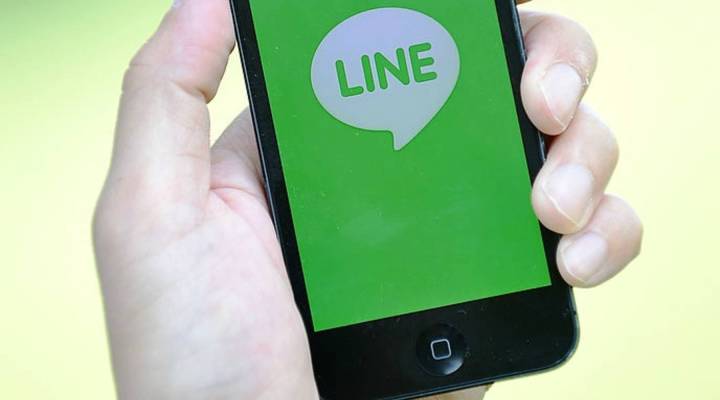
Line messaging app enters an overcrowded market

This week will bring us the biggest initial public offering of 2016. It’s a mobile messaging app named Line. It will be jointly listed in Tokyo and New York in an IPO that could raise as much as $1.3 billion.
Line is the latest edition to a very long line of messaging apps that’re already out there. Marketplace host Kai Ryssdal talks with Marketplace senior tech correspondent Molly Wood to find out why we need so many messenger apps in the first place.
On the abundance of messaging apps:
These apps are proliferating because it’s really a realization and a recognition that people don’t always…want to post every thought in public. Sometimes they actually just want to talk to their friends, one or two at a time.
On the difficulty posed to new messaging apps:
It’s very hard to be a new entrant in this category. It’s very hard for a company like Line to make a splash in the United States where it doesn’t already have a user base because it depends on the network effect. You have to have people already using an app who then get their friends to sign up so that they can communicate. You see a lot of these apps trying to add in all of these extra features to both attract users, and also make money.
On how Line and others make money:
[Line] makes about a billion dollars a year in revenue, and it does that by selling other services. App downloads, stickers, people cannot get enough of stickers, and integrating other services. WeChat in China is a really good example of a messaging app that has become a full fledged platform. You can call a taxi, you can pay people like you would with Venmo and Square Cash.
Confused by all the chat apps here and abroad? We’ve rounded up the major ones here:
| App | Monthly active users | Public or private | Estimated 2015 revenue | How’s it make money? | What’s its unfair advantage? |
| Line | 218 million | Soon to be public | $1.1 billion | The platform supports advertising and gaming, but it’s known for its stickers. Line sells thousands of emojis and animations featuring its own characters, and users send hundreds of millions a day. The company also sells merchandise based on its stickers. | The app was created to help with communication after Japan’s 2011 earthquake and tsunami, but it’s built a healthy business around its thousands of stickers and the merchandising for them. Line also has an algorithm to help users find the right sticker. |
| 1 billion | Public, via Facebook | $0 | Whatsapp used to charge $1 per year after the first year, but ended that earlier this year. It’s working on monetization in tandem with Facebook, which has not attempted to monetize since buying WhatsApp for $19 billion. | WhatsApp was the first major messaging app of its kind, and it’s built the biggest userbase of them all, second only to its parent company Faceook. It was also the first major messaging app to offer encryption, and it rolled out end-to-end encryption on all forms of communication this spring. | |
| Messenger | 900 million | Public, via Facebook | $0 | Facebook hasn’t yet directly monetized Messenger. The app is spun-off Facebook itself, which make billions in mobile advertising (Messenger users don’t strictly need a Facebook account to join). CEO Mark Zuckerberg has said Facebook will see how businesses use the platform first before it tries to monetize. | Messenger has seen remarkable growth in the past to years — thanks to Facebook migrating all its mobile users to the app in 2014. Messenger is able to is able to draw on Facebook’s trove of user data as the company introduces chatbots and branded pages to the app on its path to monetization. |
| 762 million | Public, via Tencent | Not available | WeChat is owned by the Chinese internet giant Tencent, which posted $15.8 billion in revenue last year. Tencent doesn’t report WeChat revenue separately, but the app has reportedly built a roubust advertising business alongside Tencent’s mobile gaming business. Wechat also has a small transaction fee for payments. | WeChat is woven into daily Chinese life like no other messaging app around the world. Users can effectively run their whole lives with it. According to Bloomberg: “People use WeChat to pay rent, locate parking, invest, make a doctor’s appointment, find a one-night stand, donate to charity.” | |
| Snapchat | Not available (150 million daily users) | Private | $59 million | Snapchat’s revenue estimates come from a pitch deck that leaked earlier in the year. The company has experimented with a few monetization strategies, including selling lenses, filters and replays to users and brands. The app also features video advertising with more on the way. | With its singluar model based on expiring messages, Snapchat also has unique advertising products like lenses and customized filters. Plus, the company has partnerships with many media companies via its Discover feature and rapidly expanding real estate for video advertising. |
Click the player above to hear the full interview.
There’s a lot happening in the world. Through it all, Marketplace is here for you.
You rely on Marketplace to break down the world’s events and tell you how it affects you in a fact-based, approachable way. We rely on your financial support to keep making that possible.
Your donation today powers the independent journalism that you rely on. For just $5/month, you can help sustain Marketplace so we can keep reporting on the things that matter to you.












